10 Benefits of Using a Data Marketplace Platform for Research

10 Benefits of Using a Data Marketplace Platform for Research
Overview
This article outlines ten significant benefits of utilizing a data marketplace platform for research. It emphasizes the platform's role in enhancing access to diverse datasets, improving data quality, and fostering collaboration among researchers. Each benefit is supported by evidence that demonstrates how such platforms streamline research processes. They empower informed decision-making and promote compliance with regulatory standards. Ultimately, this drives innovation and efficiency in market analysis.
Consider how these benefits can apply to your work: how might improved access to datasets enhance your research capabilities? The evidence presented illustrates that data marketplace platforms not only facilitate collaboration but also significantly elevate the quality of research outcomes. By utilizing these platforms, researchers can ensure they are making decisions based on reliable and comprehensive data.
In summary, the integration of a data marketplace platform can lead to transformative changes in the research landscape. As researchers increasingly rely on diverse datasets, the potential for innovation and efficiency in market analysis becomes more pronounced. The actionable insights derived from this article can guide you in leveraging these platforms to maximize your research impact.
Introduction
Data marketplaces are revolutionizing the landscape of market research, providing a centralized platform where researchers can access a wealth of diverse datasets with unprecedented ease. These platforms enable analysts to enhance their research capabilities, streamline workflows, and make informed decisions that align with market trends. However, as reliance on data increases, so do the challenges of ensuring data quality, security, and compliance.
How can researchers effectively navigate these complexities while maximizing the benefits of data marketplaces? This article explores ten key advantages of utilizing a data marketplace platform, shedding light on how it can transform research outcomes and empower analysts in their quest for actionable insights.
Initial Data Offering: Streamlined Access to Diverse Datasets for Market Research
The Initial Information Offering (IDO) serves as a vital centralized hub, effectively linking information purchasers and vendors. This greatly streamlines the process for market analysts seeking diverse datasets. By curating high-quality and unique collections, IDO enables scholars to swiftly locate the information they require, alleviating the challenges posed by scattered sources. Such streamlined access not only conserves valuable time but also boosts efficiency, allowing analysts to concentrate on extracting actionable insights rather than spending excessive time on information retrieval.
Moreover, with new datasets updated daily, IDO consistently provides scholars with opportunities to discover relevant collections. A significant number of market analysts now rely on centralized information systems, underscoring the growing recognition of their importance in enhancing research workflows. Effective implementations of information platforms, such as a data marketplace platform like IDO, demonstrate how centralized hubs can transform inquiry processes, facilitating analysts' access to a wide array of datasets and ultimately improving decision-making.
To remain competitive, subscribing to IDO guarantees access to premium datasets and insights, equipping analysts with the essential tools for effective market research. How can these datasets enhance your research capabilities? By leveraging IDO, analysts are empowered to make informed decisions, driving their success in an increasingly data-driven environment.
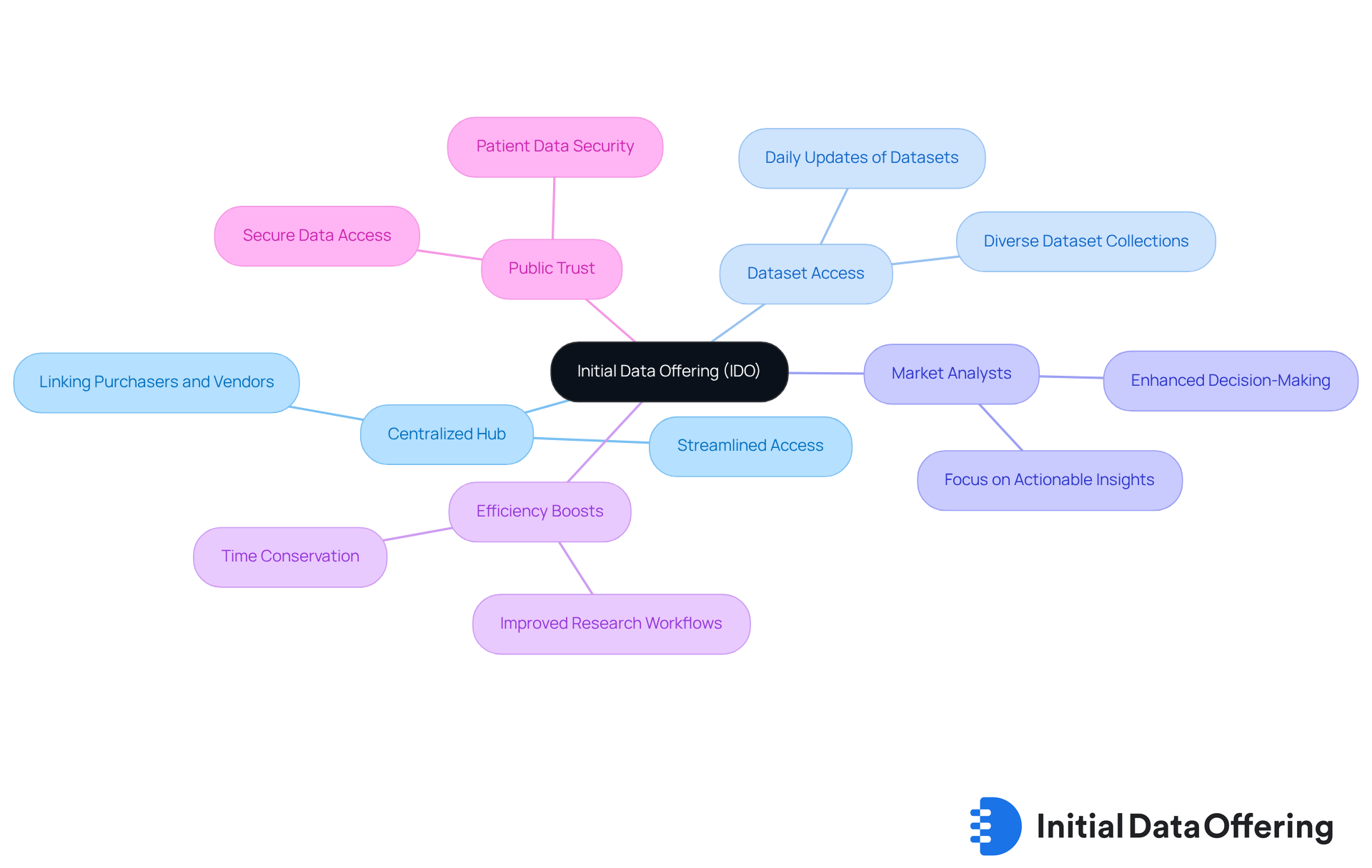
Enhanced Data Democratization: Empowering Market Researchers with Accessible Insights
Information democratization emerges as a pivotal advantage of utilizing a marketplace like IDO. By simplifying access to diverse datasets, IDO enables market analysts to extract valuable insights without requiring extensive technical expertise. This ease of access fosters a culture of insight-driven decision-making within organizations, empowering teams to leverage information that was previously confined to specialists. As a result, researchers are equipped to make informed decisions that align with current market trends and consumer preferences.
Organizations are increasingly acknowledging the importance of data-driven decision-making, with a significant percentage adopting this strategy. Notably, 71% of brands with substantial advertising expenditures view AI for personalization and optimization as a crucial trend for 2025, underscoring the growing reliance on insights. Furthermore, as companies transition toward integrated information platforms, the ability to access a collective resource of information will enhance collaboration and alignment across departments, ultimately leading to improved business performance.
Industry leaders emphasize the transformative potential of accessible information. For instance, Fabio De Bernardi noted that democratizing information places decision-making authority directly in the hands of those closest to customers, fostering innovation at every level of the organization. This shift not only boosts the agility of marketing teams but also bridges gaps between various departments, promoting seamless collaboration and informed strategies.
Moreover, effective visualization tools are vital for enhancing the understanding of information, making insights more comprehensible and actionable for analysts. By converting complex datasets into clear, visual narratives, organizations can facilitate better understanding and expedite decision-making.
In conclusion, information marketplaces like IDO play an essential role in empowering researchers by providing accessible insights that drive informed decision-making and cultivate a culture of accountability and curiosity within organizations.
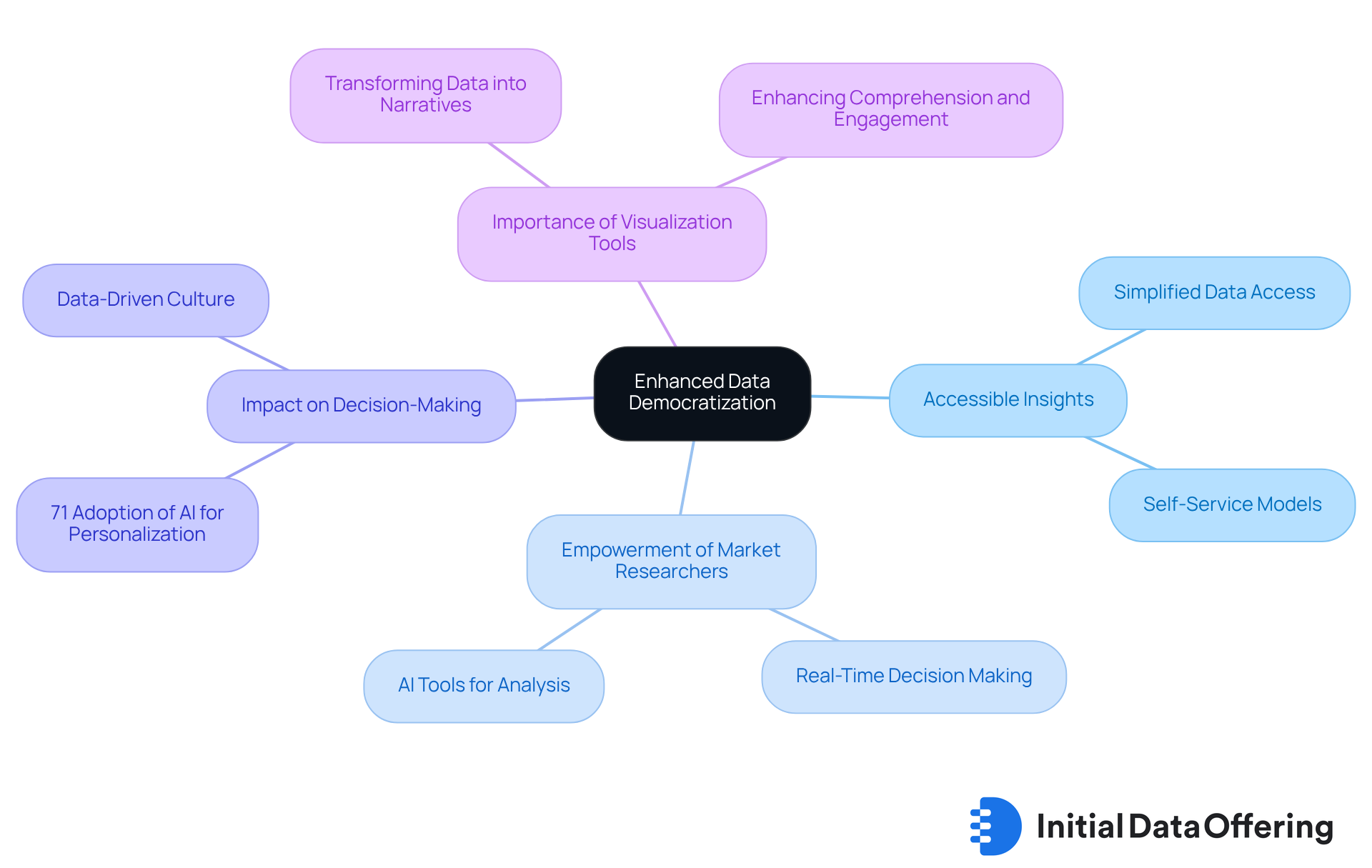
Improved Data Quality: Ensuring Reliable Insights for Market Analysis
A defining characteristic of IDO is its unwavering commitment to information quality. The data marketplace platform employs rigorous quality control measures to ensure that datasets are not only accurate but also relevant and reliable. By sourcing datasets from reputable providers and enabling users to rate and review information offerings, IDO cultivates a data marketplace platform that ensures only high-quality information is accessible. This focus on information integrity is vital for market analysts.
Did you know that 30% of marketing experts prioritize quality enhancements to improve their performance? They acknowledge that inadequate information quality can result in substantial financial losses, estimated at $12.9 million each year. Reliable datasets empower researchers to make informed decisions, ultimately driving better strategic outcomes.
As Cristian Randieri, a Forbes Councils Member, states, "Raw or unclean information is not optimal in business since misleading information leads to wrong decisions."
In a landscape where the challenges of data quality are prevalent, IDO's data marketplace platform serves as a vital resource for those seeking actionable insights in their research endeavors.
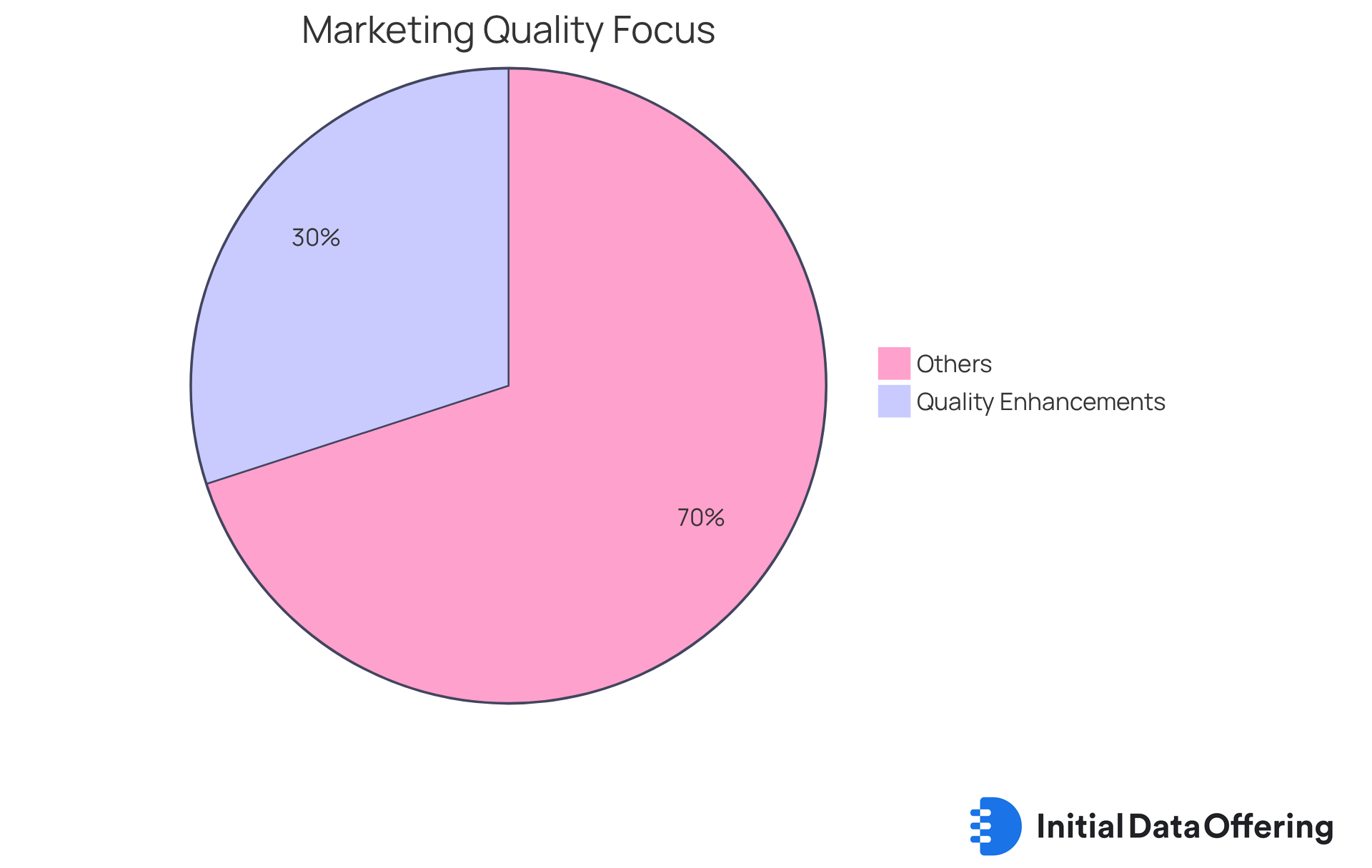
Accelerated Innovation: Leveraging Marketplaces for Cutting-Edge Research
The data marketplace platform, such as the Initial Data Offering (IDO), plays a pivotal role in accelerating innovation by granting analysts access to unique and diverse datasets that often elude traditional channels. This access empowers researchers to explore new avenues of inquiry, rigorously test hypotheses, and develop innovative solutions to complex challenges. Notably, 71 percent of scholars anticipate that synthetic responses will dominate market analysis within the next three years, underscoring the growing reliance on distinctive datasets for generating insights. Furthermore, 87 percent of individuals who have employed synthetic responses report high satisfaction with the results, particularly for testing packages, names, and messaging.
By subscribing to the Initial Data Offering available on a data marketplace platform, market analysts can discover new collections daily, ensuring they remain at the forefront of their field with premium access to high-quality information. Leveraging the latest data trends allows professionals to maintain a competitive edge and drive significant changes within their organizations. For instance, users of unique datasets have reported substantial improvements in market analysis, with many noting that these datasets enhance the depth and accuracy of their findings.
As we approach 2025, the integration of unique datasets is poised to further revolutionize research methodologies, paving the way for groundbreaking studies that redefine industry standards. How will you leverage these unique datasets to enhance your analyses and drive innovation in your field?
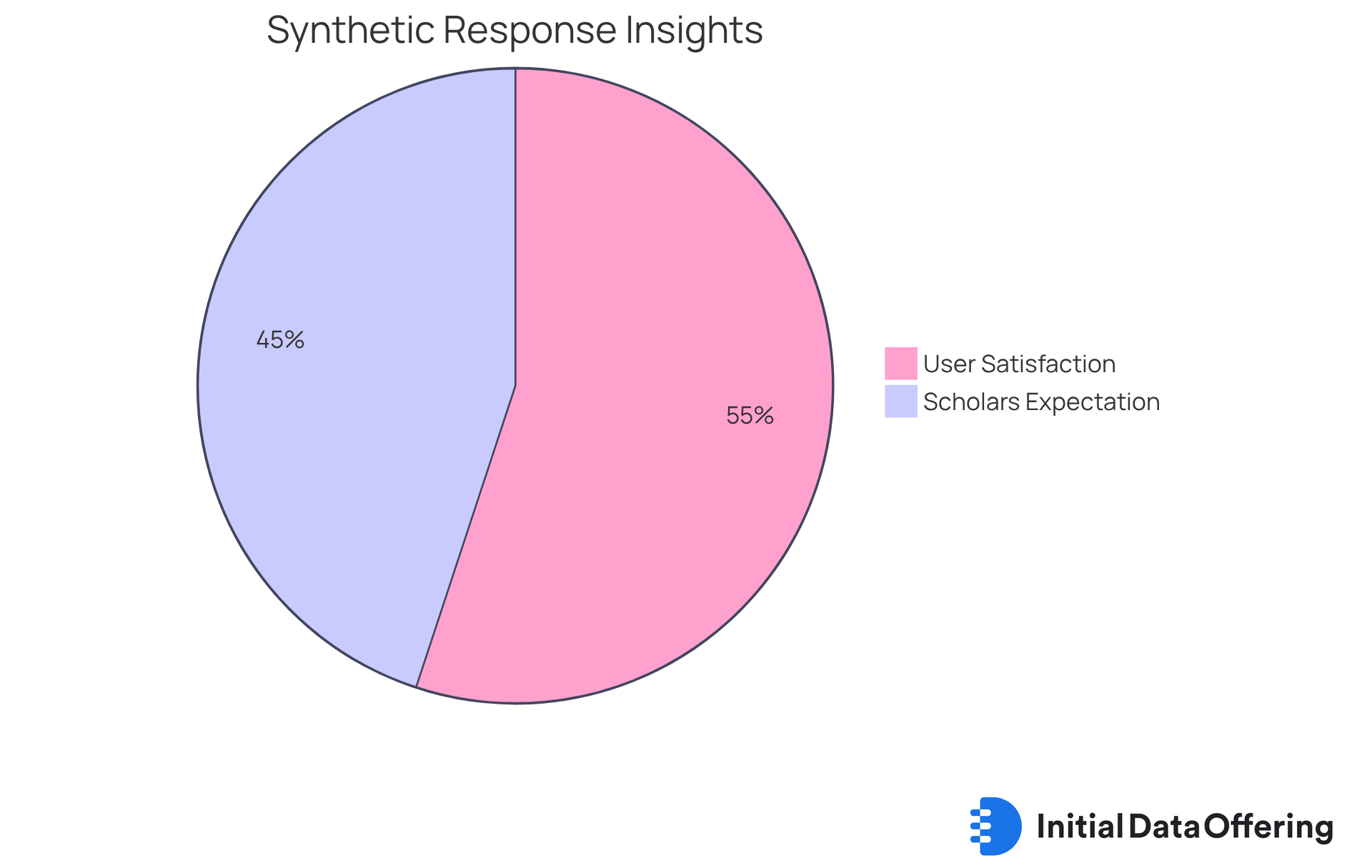
Cost Efficiency: Maximizing Research Budgets with Data Marketplaces
Utilizing a marketplace like IDO offers significant cost reductions for market researchers. Features of IDO include a varied range of datasets available at attractive prices. Advantages of this approach are that it alleviates the strain of costly information gathering procedures and allows researchers to selectively acquire only the necessary information. This enables a more strategic allocation of their budgets. Benefits include improved cost effectiveness and the ability for organizations to broaden their investigative capabilities without compromising quality.
For example, organizations that have adopted information marketplaces report substantial decreases in research expenses. This allows them to invest more in analysis and insights rather than in information acquisition. Have you considered how these marketplaces could optimize your research budget? According to industry insights, the data marketplace platform segment in the B2B sector is anticipated to experience a CAGR of 24.6%, indicating a growing trend towards cost-effective information solutions. Additionally, the subscription sector is expected to expand at a CAGR of 27.2%, reflecting the increasing dependence on marketplaces for budget optimization.
Consequently, data marketplace platforms are becoming vital resources for optimizing research budgets in an increasingly information-driven environment. They also ensure adherence to legal standards such as GDPR and CCPA, which is crucial for maintaining compliance in data handling.
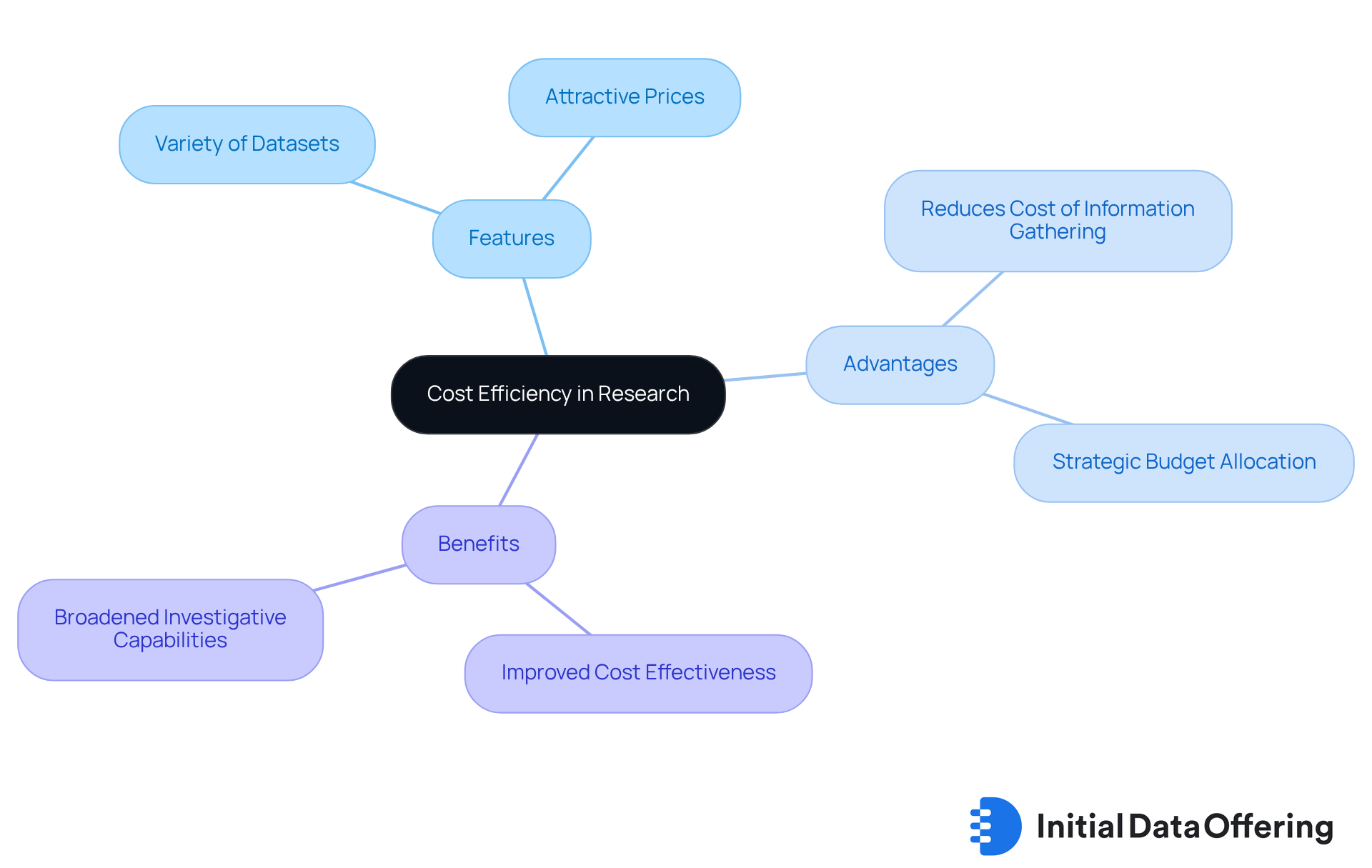
Informed Decision-Making: Enhancing Business Strategies through Data Insights
Access to diverse datasets through IDO significantly enhances informed decision-making for market researchers. These datasets provide organizations with valuable insights that enable them to identify emerging trends and gain a deeper understanding of consumer behavior. Consequently, businesses can make strategic decisions that align with market demands. For instance, companies like Starbucks have effectively utilized demographic and traffic pattern information to optimize store placements, illustrating the tangible benefits of analytics-driven strategies.
Moreover, a recent survey indicated that 74% of organizations have increased their reliance on insights for strategic decisions. This statistic underscores the growing importance of informed decision-making in market research. By adopting a data-centric approach, organizations not only improve the accuracy of their business strategies but also cultivate a culture of continuous improvement and adaptability. This enables them to respond effectively to evolving market conditions.
However, organizations face challenges such as information quality and security, which remain significant obstacles to fully leveraging insights. As Brent Dykes emphasizes, fostering a data-driven mindset is essential for overcoming these challenges and enhancing decision-making capabilities. How can organizations ensure they are utilizing their data effectively? By addressing these issues, companies can unlock the full potential of their insights and drive better outcomes.
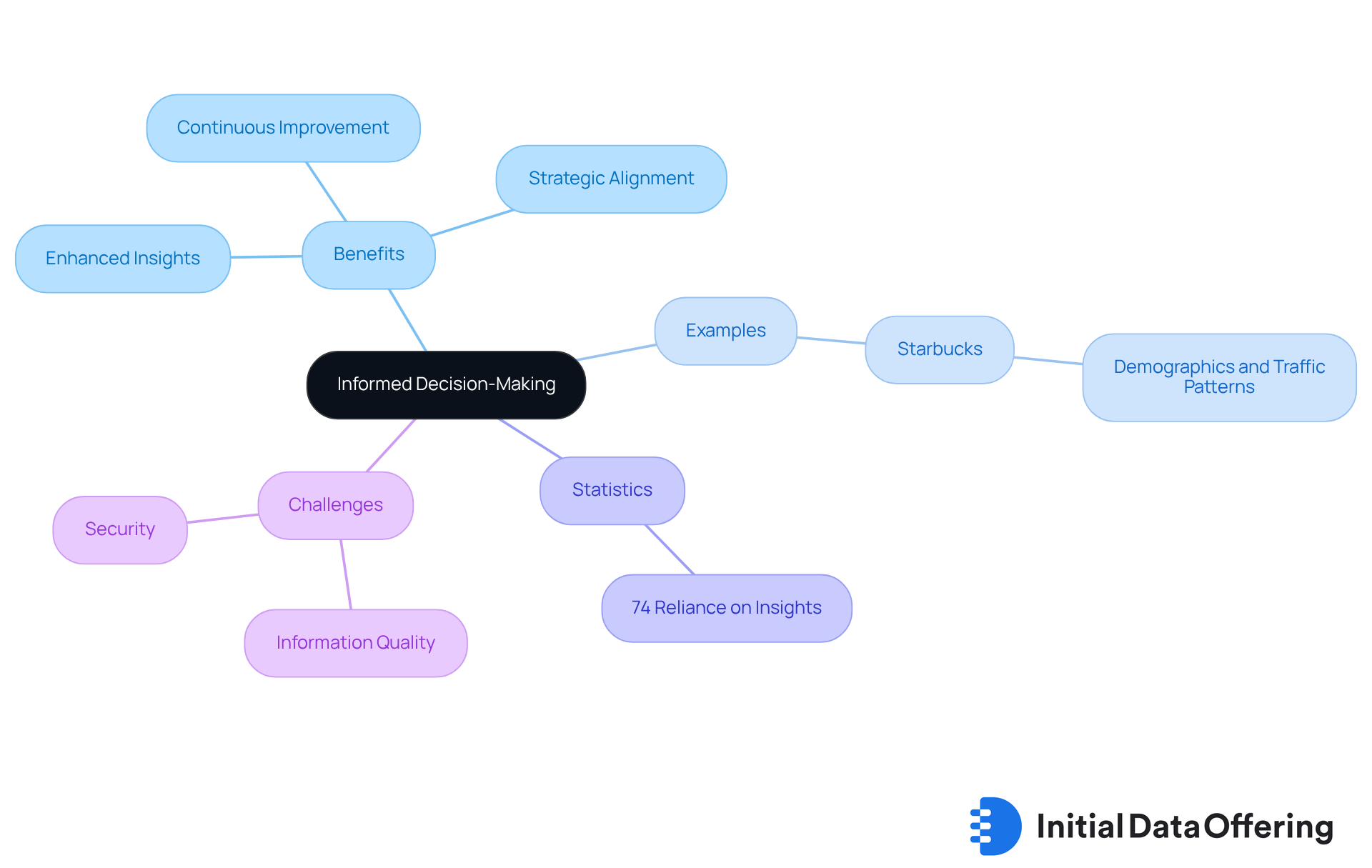
Diverse Data Variety: Accessing Multiple Data Types for Comprehensive Analysis
IDO serves as a vital hub within a data marketplace platform for high-quality datasets, which include alternative information, fundamentals, and ESG metrics essential for market analysts conducting thorough evaluations. The integration of diverse information types, such as SavvyIQ's AI-powered Recursive Information Engine that enhances a dynamic graph of 265 million global entities, alongside Hazeltree's collection that captures long and short equity positions from over 600 funds, allows researchers to explore multiple perspectives and factors. This multifaceted approach fosters a deeper understanding of market dynamics.
For instance, studies utilizing alternative information can reveal consumer behavior trends, while fundamentals offer insights into financial performance, and ESG metrics highlight sustainability indicators. Moreover, Hazeltree's dataset offers extensive global information on equity crowding and fund positions through a data marketplace platform, which is crucial for hedge fund analysis and understanding market trends.
Ultimately, this comprehensive strategy not only enhances analytical methods but also empowers analysts to develop more effective solutions tailored to the complexities of the market. Research indicates that a significant percentage of analysts now leverage various information types, underscoring the growing recognition of their value in facilitating informed decision-making and strategic planning.
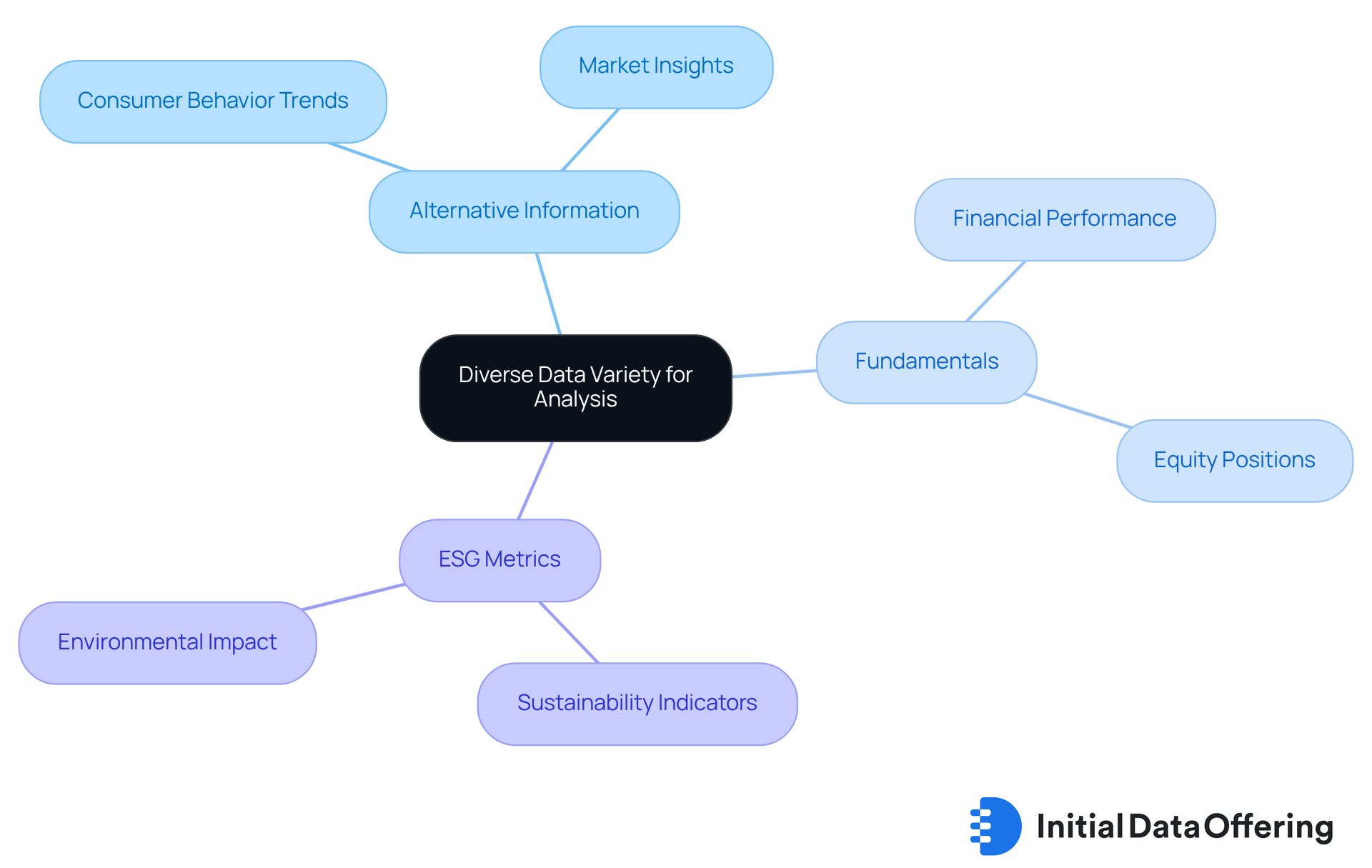
Robust Data Security: Protecting Sensitive Market Research Information
Data security is paramount at IDO, where safeguarding sensitive market research information from unauthorized access and breaches is a core commitment. The platform employs advanced security measures, including robust encryption protocols and secure storage solutions, to effectively safeguard user information. This proactive strategy assists investigators in adhering to strict regulations and cultivates trust among stakeholders.
Importantly, a considerable portion of scholars raise issues regarding information security. For instance, 47% of adults in 12 nations have ended associations with firms because of privacy policies. As cybersecurity specialists stress, safeguarding market research information is vital for upholding the integrity of research results and ensuring the confidentiality of sensitive information. Platforms like Secoda implement similar security measures to protect sensitive information.
By applying these security protocols, IDO establishes itself as a trustworthy ally for individuals seeking to navigate the intricacies of information management in a secure setting. To further improve information security, experts are encouraged to routinely assess their protection strategies and remain updated on new security technologies. How can you ensure your organization's data security aligns with best practices? Regular evaluations and adaptations to security protocols can enhance protection and foster trust in your research outcomes.
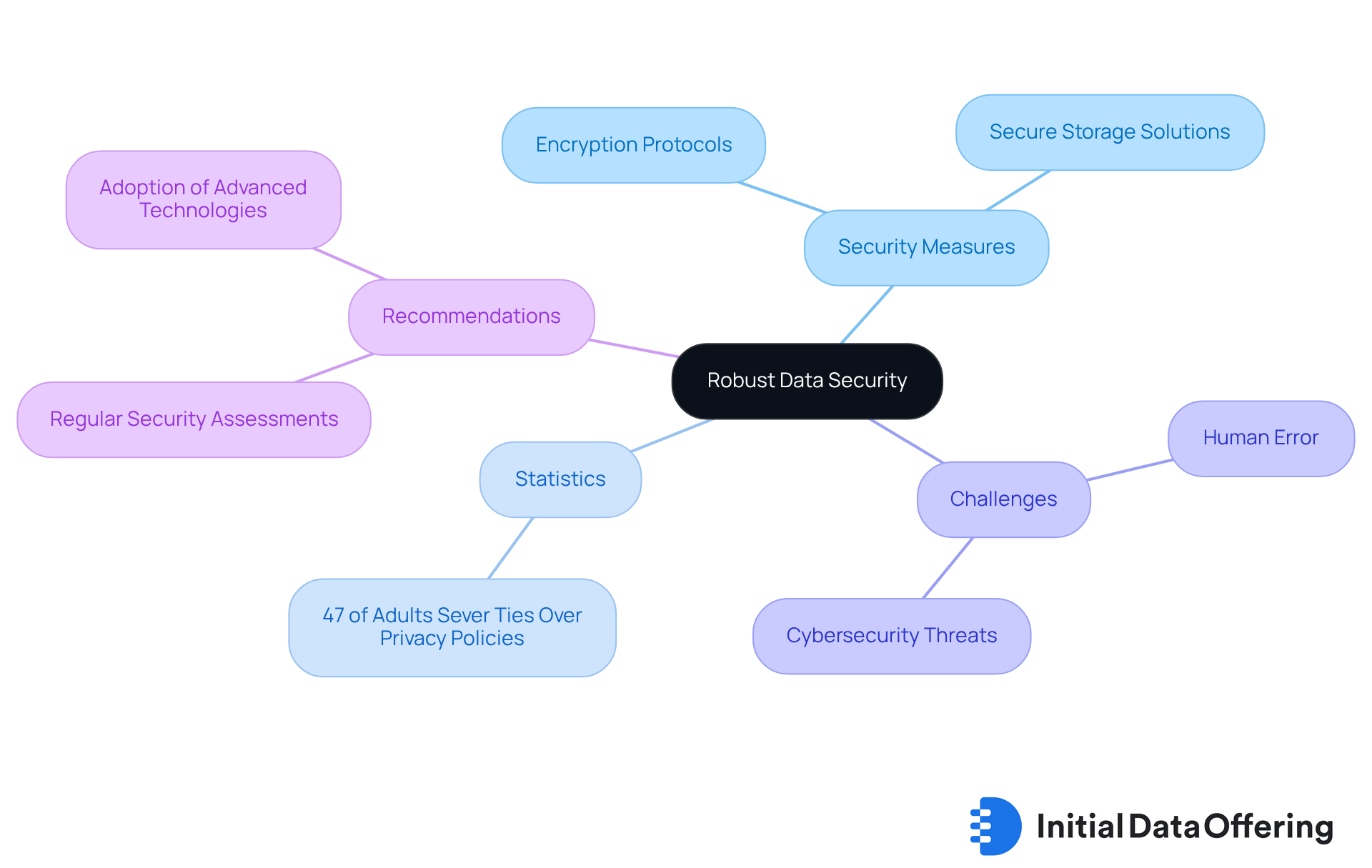
Collaboration Opportunities: Fostering Partnerships for Enhanced Research Outcomes
Information marketplaces, such as IDO, play a crucial role in promoting cooperation among scholars, information providers, and organizations. By linking various stakeholders, IDO facilitates the exchange of insights and resources, significantly enhancing study outcomes. Collaborative efforts often lead to innovative solutions and a deeper understanding of market dynamics, ultimately benefiting all parties involved.
Studies indicate that approximately 76% of scholars engage in collaborations via information platforms, underscoring the growing trend of teamwork within the research community. This statistic is further supported by the fact that 76% of marketers also leverage data collaboration platforms to broaden their reach, illustrating the widespread acknowledgment of the advantages of data sharing across diverse sectors. Such partnerships streamline access to valuable datasets and foster the exchange of knowledge and expertise. For example, financial institutions and academic experts can work together to analyze market trends, resulting in more accurate predictions and informed decision-making.
Moreover, citations from scholars underscore the significance of these collaborations. One researcher noted, "Collaborative information exchange enables us to access a wider variety of datasets, which improves the depth and quality of our findings." This sentiment reflects a growing recognition of the benefits that partnerships bring to market research.
Instances of successful collaborations established through information platforms further illustrate this point. A partnership between healthcare organizations and information providers has allowed researchers to share anonymized patient information, expediting drug development and improving patient outcomes. Similarly, financial institutions share anonymized transaction data to identify unusual patterns that may indicate fraudulent activities, demonstrating the diverse applications of collaborative information sharing across sectors. This collaboration not only enhances the investigative process but also contributes to progress across various domains, showcasing the transformative impact of information exchange in research.
As the data marketplace platform sector is projected to reach USD 5.73 billion by 2030, the significance and value of these platforms in the research landscape continue to grow.
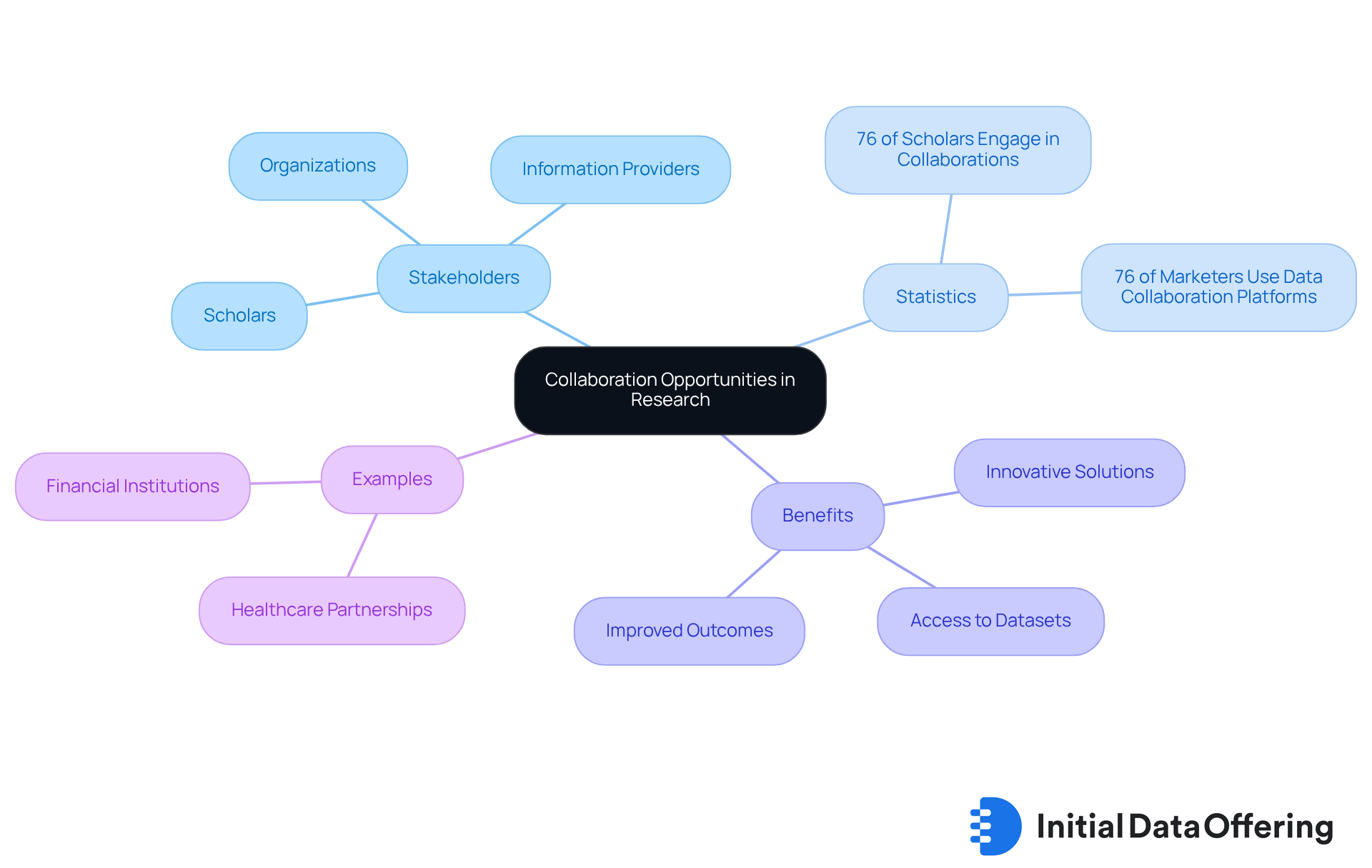
Compliance and Governance Support: Navigating Regulatory Challenges in Market Research
IDO provides robust support for compliance and governance, assisting scholars in navigating the complex regulatory landscape surrounding information usage. By adhering to industry standards and best practices, IDO enables researchers to conduct their work ethically and responsibly. This support is vital for maintaining information integrity and protecting the rights of participants, ultimately fostering confidence in the research process.
Recent studies reveal that over 70% of researchers are aware of data governance regulations; however, many face challenges in implementing them effectively. This statistic highlights the significance of a data marketplace platform like IDO in bridging the gap between awareness and practical application.
Furthermore, legal experts stress the importance of comprehending regulatory challenges in market research. As one expert remarked, "Navigating the regulatory landscape requires not only awareness but also actionable insights and tools to ensure compliance."
IDO's data marketplace platform not only provides access to high-quality datasets but also includes features that assist users in understanding and adhering to relevant regulations. For example, IDO provides clear guidelines and resources that empower researchers to concentrate on their core objectives without being impeded by compliance concerns.
Ultimately, IDO's commitment to cultivating a compliant research environment enhances the overall quality and reliability of insights generated, benefiting the entire research community.
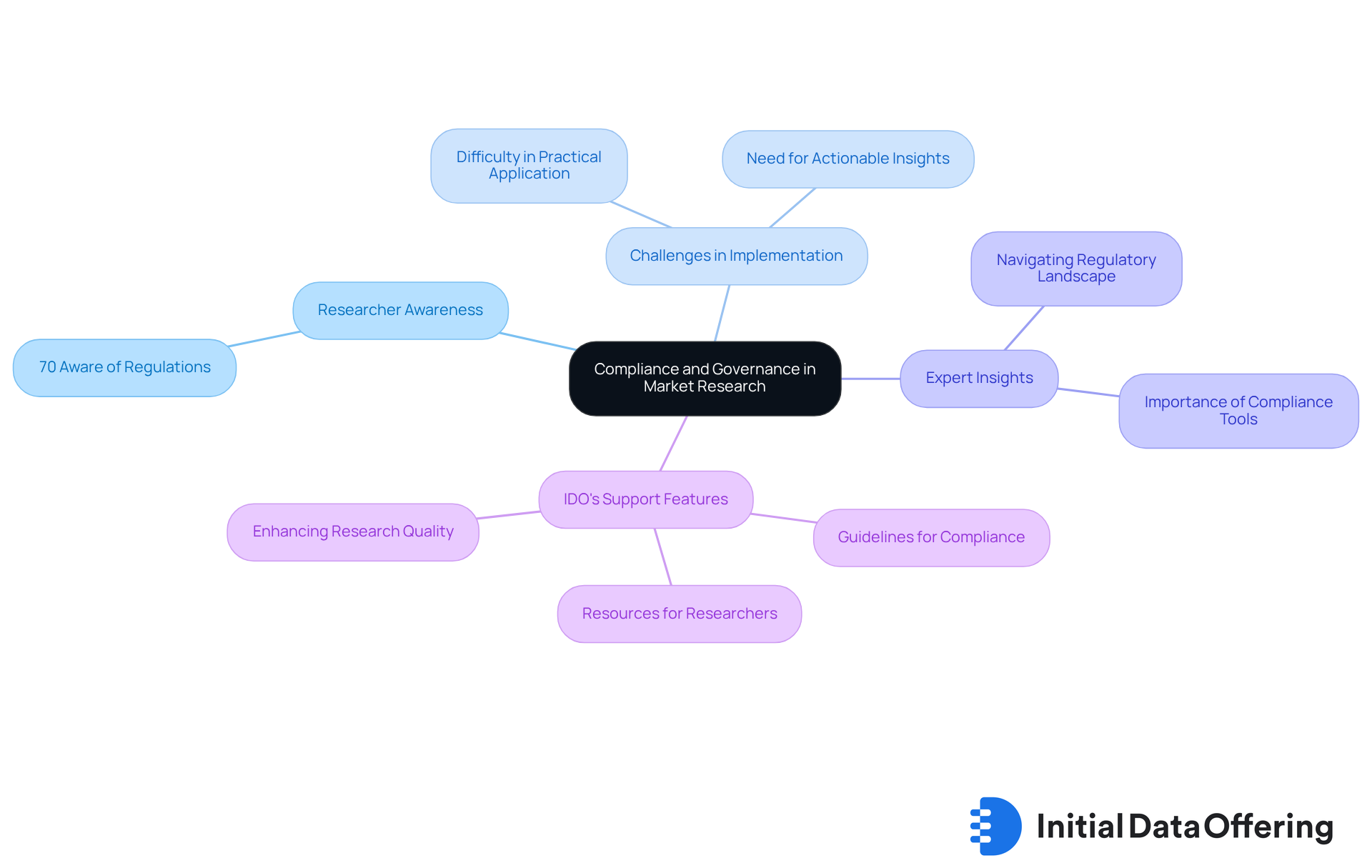
Conclusion
The advantages of utilizing a data marketplace platform like the Initial Data Offering (IDO) are profound, significantly enhancing the efficiency and effectiveness of market research. By centralizing access to diverse datasets, IDO streamlines the research process and empowers analysts with the tools needed for informed decision-making. This transformation fosters a data-driven culture within organizations, enabling researchers to extract valuable insights swiftly and accurately.
Key points throughout the article highlight how IDO addresses critical aspects such as:
- Data democratization
- Quality assurance
- Cost efficiency
- Collaboration
The platform facilitates access to high-quality datasets, promotes innovation through unique information, and ensures adherence to compliance and governance standards. Furthermore, the emphasis on robust data security protects sensitive information, thereby building trust among stakeholders. Collectively, these elements contribute to a more agile and informed research environment.
In an increasingly data-centric world, leveraging platforms like IDO can be a game-changer for market analysts. The ability to harness diverse data types not only enriches analysis but also enhances strategic decision-making capabilities. As organizations continue to navigate complex market dynamics, embracing the benefits of data marketplaces will be essential for fostering innovation, optimizing research budgets, and ultimately driving successful outcomes. Engaging with these platforms represents a proactive step toward unlocking the full potential of data in market research.
Frequently Asked Questions
What is the Initial Data Offering (IDO)?
The Initial Data Offering (IDO) is a centralized hub that connects information purchasers and vendors, streamlining access to diverse datasets for market analysts. It helps scholars quickly locate high-quality and unique datasets, improving efficiency in research.
How does IDO improve the market research process?
IDO enhances the market research process by providing streamlined access to datasets, saving analysts time on information retrieval, and allowing them to focus on extracting actionable insights. New datasets are updated daily, ensuring continuous access to relevant information.
Why is data democratization important in market research?
Data democratization is crucial as it simplifies access to diverse datasets, enabling market analysts to extract insights without extensive technical expertise. This fosters a culture of insight-driven decision-making, empowering teams to leverage information that was previously limited to specialists.
What percentage of brands view AI for personalization as a crucial trend for 2025?
71% of brands with substantial advertising expenditures consider AI for personalization and optimization as a crucial trend for 2025, highlighting the growing reliance on data-driven insights.
How does IDO ensure data quality?
IDO ensures data quality through rigorous quality control measures, sourcing datasets from reputable providers, and allowing users to rate and review information offerings. This commitment to information integrity is essential for providing reliable insights for market analysis.
What are the consequences of inadequate information quality in marketing?
Inadequate information quality can lead to substantial financial losses, estimated at $12.9 million each year, as it results in misleading information that can lead to wrong decisions.
How do visualization tools enhance data understanding?
Effective visualization tools convert complex datasets into clear, visual narratives, making insights more comprehensible and actionable for analysts, which facilitates better understanding and expedites decision-making.
What role does IDO play in fostering collaboration within organizations?
IDO enhances collaboration by providing access to a collective resource of information, leading to improved alignment across departments and promoting a culture of accountability and curiosity within organizations.